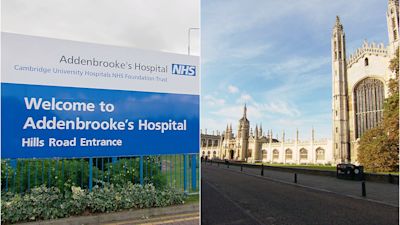Addenbrooke's study finds single dose of Pfizer vacccine dramatically reduces asymptomatic Covid infections

Hear more about the research from Dr Mike Weekes, who led the study. He spoke to ITV News Anglia's Becky Jago earlier today.
New data from Addenbrooke's Hospital in Cambridge, and Cambridge University, shows a single dose of the Pfizer BioNTech jab not only protects people from getting ill, but also dramatically reduces the chances of them spreading the virus to others.
According to the research, one dose of the vaccine can reduce by four-fold the number of asymptomatic Covid-19 infections.
This suggests that the vaccine could significantly reduce transmission of the virus among people who have no symptoms, as well as protecting others from getting ill.
Vaccination for health care workers on the sites of Cambridge University Hospitals NHS Foundation Trust Sites, which Addenbrooke's belongs to, began on the 8th of December 2020, with mass vaccination from the 8th of January 2021.
Thousands of Covid-19 tests were analysed to gather the data as part of a screening programme on hospital staff who showed no signs of infection.
The study found that 26 out of 3,252 tests from unvaccinated healthcare workers were positive. This compared to 13 out of 3,535 tests from healthcare workers less than 12 days post-vaccination and 4 out of 1,989 tests from healthcare workers at 12 days or more post-vaccination.
This suggests a four-fold decrease in the risk of asymptomatic Covid infections amongst healthcare workers who have been vaccinated for more than 12 days.
When the team included healthcare workers who did have symptoms, their analyses showed similar reductions.